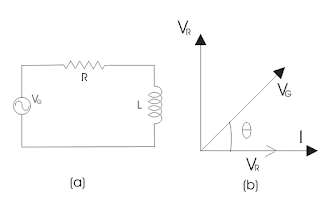RL Circuit acts as a resistor and Inductor and Common Application in Practical Life
RL Circuit:
When a resistor (R) and a inductor (L)
are connected in series with a ac voltage source (v), then it is called series
RL circuit. It is a first order differential circuit. In this circuit,
the values of R , L and v are fixed. By varying the frequency of the applied
voltage, this RL circuit acts as a resistive circuit and inductive circuit.
 |
Fig-1: RL Circuit |
Total impedance of the
circuit Z = sqr(R2 + XL2)
From the above equation
we see that , total impedance of a RL circuit consist of resistance and inductive
reactance. The total impedance changes with frequency.
RL circuit acting as a Resistor:
As we know that, Inductive
reactance, XL = 2πfL,
that is inductive reactance increases with increasing signal frequency.
So at low frequency, the
RL circuit acts as a resistive circuit, because at low frequency, inductive
reactance will be much much lower than the resistance. And the circuit will act
as a resistor and shows all the properties that a resistor can show. i.e
1.
The
circuit will loss energy or convert energy as a form of heat.
2.
Phase
shift between voltage and current will be zero .
RC circuit acting as a Inductor:
At high frequency , Inductive reactance ,
XL will be high than the resistance, and the whole circuit will
act as a inductor and shows all the properties that a inductor can show. i.e
1. This circuit will store energy in the form
of magnetic flux.
2. Phase shift between voltage and current
will be 90 degree
3. Voltage will lead current by 90 degree.
 |
Fig-2: Phase Shift of a RL Circuit |
So , just by changing signal frequency , we can convert a RL
circuit as a resistive circuit and Inductive circuit.
Common
Applications of RL circuit :
These are some common
application of RL circuit
1. Low pass filter
2. High pass filter
3. Notch filter
5. Determine in time constant
etc



Comments
Post a Comment